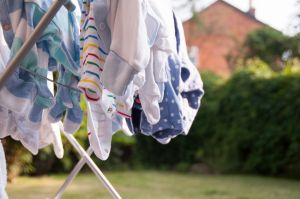While the easiest way to reduce your dryer’s energy consumption is to cut back on how much you use it, that’s not always an option during the cold winter months in southern parts of Australia or in the humid months in northern parts of the country. Thankfully, there are ways to solve this problem. In this Canstar Blue guide , we reveal how much a dryer will cost you on average each year, plus share some handy tips that may help you to reduce these costs.
On this page:
How much electricity does a clothes dryer use?
A basic vented clothes dryer will generally cost between $95 and $667 a year to run, depending on the number of loads done each week. A condenser dryer on the other hand, will typically cost between $53 and $347 annually. Keep in mind that electricity rates vary depending on your location, retailer and plan. The running cost of a clothes dryer will also, of course, depend on the model, capacity and energy efficiency. Here are some approximate yearly costs of running a vented dryer or condenser dryer in a little more detail:
| Loads per week | Annual cost of Vented Dryer | Annual cost of Condenser Dryer |
|---|---|---|
| 1 | $95 | $53 |
| 3 | $286 | $160 |
| 5 | $476 | $267 |
| 7 | $667 | $374 |
Source: www.canstar.com.au – 30/04/24. Average usage per load of condenser dryers (3.34 kWh) and vented dryers (5.94 kWh) based on dryers with a capacity of between 5 and 10kg listed in the Commonwealth of Australia E3 Program’s Registration database. Electricity usage cost estimates based on the average electricity usage rate of 31.6 c/kWh. Average electricity usage rates are based on single-rate, non-solar only plans on Canstar’s database, available for an annual usage of 4,378 kWh.
While vented clothes dryers are more expensive to run than condenser dryers, they are usually cheaper to buy upfront. It’s common to find one under $500 and rarely do they top $1,000.
Is it cheaper to run an energy-efficient dryer?
There are two costs you should consider when purchasing a clothes dryer – the initial tag price and the ongoing electricity usage costs. While a certain model of clothes dryer might appear cheaper at the outset, you may find it will cost you in the long term if it’s not energy efficient. The table below represents the estimated cost per clothes dryer cycle and annual cost, depending on its energy efficiency rating.
Condenser Dryer
| Star Rating | Cost per load | Annual cost (1 load per week) |
|---|---|---|
| 1 to 4 stars | $1.59 | $83 |
| 5 to 10 stars | $0.82 | $43 |
Vented Dryer
| Star Rating | Cost per load | Annual cost (1 load per week) |
|---|---|---|
| 1 to 4 stars | $1.83 | $95 |
Source: www.canstar.com.au – 30/04/24. Average usage per load of 1 to 4 star condenser dryers (5.15 kWh), 5 to 10 star condenser dryers (2.65 kWh) and vented dryers (5.94 kWh) based on dryers with a capacity of between 5 and 10kg listed in the Commonwealth of Australia E3 Program’s Registration Database, which assumes 1 full load per week. Electricity usage cost estimates based on the average electricity usage rate of 31.6 c/kWh. Average electricity usage rates are based on single-rate, non-solar only plans on Canstar’s database, available for an annual usage of 4,378 kWh. .
Cheap Electricity Plans
Here are some of the cheapest published deals from the retailers on our database that include a link to the retailer’s website for further details. These are products from referral partners†. These costs are based on the Ausgrid network in Sydney but prices may vary depending on your circumstances. This comparison assumes general energy usage of 3900kWh/year for a residential customer on a single rate tariff. Please use our comparison tool for a specific comparison in your area. Our database may not cover all deals in your area. As always, check all details of any plan directly with the retailer before making a purchase decision.
Here are some of the cheapest published deals from the retailers on our database that include a link to the retailer’s website for further details. These are products from referral partners†. These costs are based on the Citipower network in Melbourne but prices may vary depending on your circumstances. This comparison assumes general energy usage of 4000kWh/year for a residential customer on a single rate tariff. Please use our comparison tool for a specific comparison in your area. Our database may not cover all deals in your area. As always, check all details of any plan directly with the retailer before making a purchase decision.
Here are some of the cheapest published deals from the retailers on our database that include a link to the retailer’s website for further details. These are products from referral partners†. These costs are based on the Energex network in Brisbane but prices may vary depending on your circumstances. This comparison assumes general energy usage of 4600kWh/year for a residential customer on a single rate tariff. Please use our comparison tool for a specific comparison in your area. Our database may not cover all deals in your area. As always, check all details of any plan directly with the retailer before making a purchase decision.
Here are some of the cheapest published deals from the retailers on our database that include a link to the retailer’s website for further details. These are products from referral partners†. These costs are based on the SA Power network in Adelaide but prices may vary depending on your circumstances. This comparison assumes general energy usage of 4000kWh/year for a residential customer on a single rate tariff. Please use our comparison tool for a specific comparison in your area. Our database may not cover all deals in your area. As always, check all details of any plan directly with the retailer before making a purchase decision.
What about other types of dryers?
If you’re looking for an alternative drying option, heat pump and gas clothes dryers could be the answer.
Heat-Pump Clothes Dryers
Heat pump dryers dehumidify the processing air and keep heat contained within the machine, resulting in less heat escaping and preventing your laundry from getting fogged up. It’s like a condenser dryer, but the humid air can’t escape. As such, heat pump dryers are some of the most efficient dryers on the market.
Gas Clothes Dryers
Another viable option is a gas powered dryer. These can be powered by natural gas or LPG. However, they usually come with a higher retail cost. Prices for a gas heater start at about $1,700 and can go as high as $4,000. So while you’re energy costs relating to your dryer will drastically reduce, it can take a long time to recoup the costs based on initial purchase price.
How can I reduce my clothes dryer costs?
It’s understandable if none of these energy-efficient dryers are viable options for you. You may be renting, you may not use a dryer much, or you may struggle to see value in purchasing something that costs $1,000 in the name of saving a few dollars. In any case, here are three easy ways to minimise the damage your clothes dryer has on your next energy bill.
Use the dryer in off-peak periods
If you are on a time of use tariff that accounts for energy usage differently depending on time of day, then consider using your dryer in either ‘shoulder’ or ‘off-peak’ periods. The convenience of loading your dryer as soon as you get home from work is undeniable, but chances are it’s costing you. With most retailers, off-peak rates are nearly half the price of peak rate and even shoulder periods offer some significant savings. They’re not very convenient, but if you can bear having to dry your clothes at 10pm then you might find your electricity bill friendlier next quarter.
You might also like:
Don’t under/overload your dryer
Overloading a dryer is easy, especially when you’ve got a load full of wet clothes you just want to get out of your hair. Overloading means your clothes have less chance to be fully dried. This means that you’ll likely require a second cycle to fully dry them. With dryer costs up to $2 a load, one more load means that’s now up to $4 out of your pocket.
By the same token, you want to make the most of your load. Under-loading means that you’re simply not getting the most out of your dryer; why waste up to $2 on two shirts and a pair of underwear? Save your dirty clothes where you can, do one wash to fill the washer and dryer the best, and make the most of that $2.

Consider an indoor clothesline
If you live in an apartment block, we appreciate you’re often stuck between a rock and hard place about what you can do to dry your clothes. A full-blown clothesline isn’t feasible, and using the dryer can be both costly and environmentally-unfriendly. In comes the indoor clothesline or ‘clothes horse’. These can be purchased for around $10, and are a great compromise. If you have a balcony, you can also place it outside for even quicker drying.
What type of dryer will be best for me?
Owning and using a clothes dryer isn’t exactly cheap. Dryers are frequently seen as one of the most energy-sucking appliances in the house. Though several types of dryer have largely broken that stigma; condenser, heat-pump and gas-powered types of dryer all employ technologies that minimise power use compared to traditional vented dryers. These innovative dryers don’t come cheap though – mostly over $1,000, with some over $5,000. Before buying one you’ll have to consider how much you actually use your dryer and whether you can bear the burden of a hefty upfront cost for slow, long-term money saving.
If you need help choosing a new dryer for your home, be sure to check out our annual clothes dryer ratings. Here, consumers rate which brands they think are top notch across a variety of categories, from performance and reliability, value for money, design, overall satisfaction and more.




Share this article